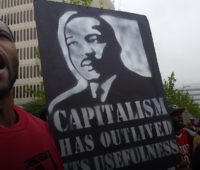For the “Race & Capitalism” series, Jodi Melamed and Chandan Reddy argue that the notion of rights—a core component of liberalism—actually functions to underpin capitalist exploitation and racial exclusions. Their critical perspective looks back at the history of how differential rights have played this role, and how the process of “winning rights” by excluded groups can be repurposed to protect the interests of capital and limit extending new kinds of rights (e.g., for LGBTQ communities). In the current moment, they claim that the rights of minorities and the poor are principally the right to be “handled” and administered by powerful public and private interests.
























